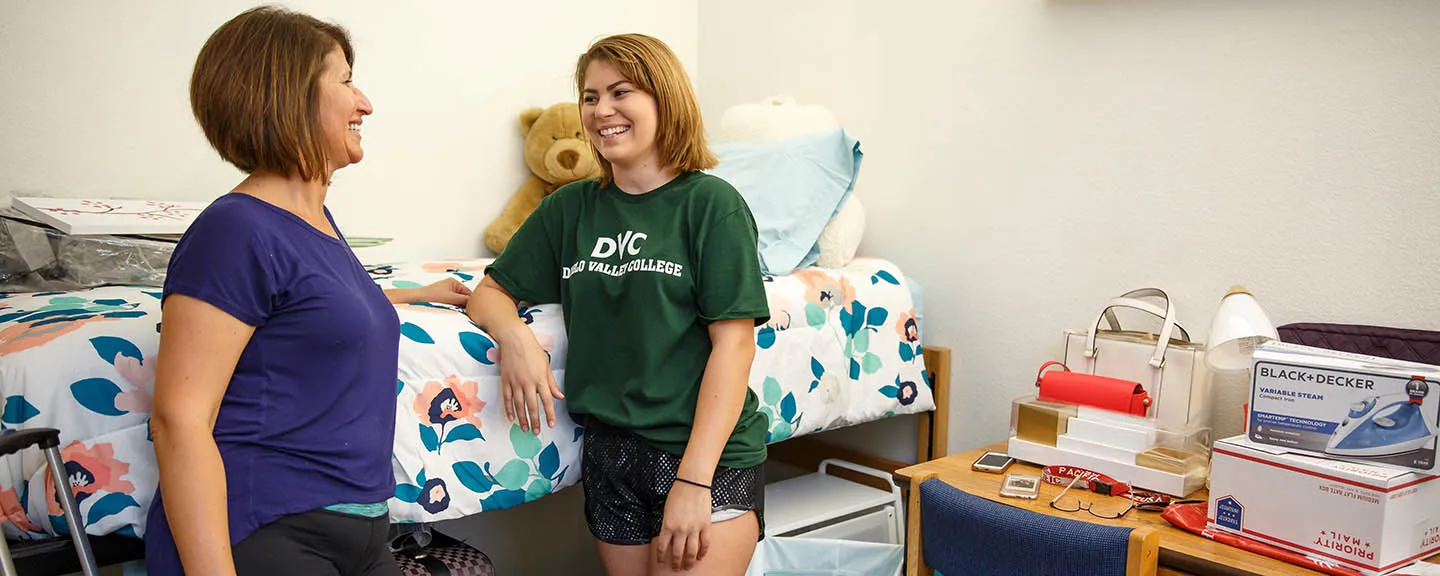- Home
- >
- APU Articles
- >
- News Article
10 Tips to Share Before Your Student Leaves for College
April 24, 2018 | Written By Naomi Mannino

Not only will these tips keep you from receiving a panicked text message at 2 a.m. asking, “Why are all my shirts suddenly pink?!” but they will help you rest easy knowing your child is prepared to leave the nest and make the most of his or her college experience. Here are 10 important lessons to impart before your student leaves home.
1. Your Personal Laundry Secrets
It’s a good idea to let your student in on your laundry secrets. Teach them how to use both machines properly, and don’t forget crucial details like how much detergent to use and how to clean the lint screen before using the dryer. This way, they won’t feel helpless come laundry day, and they’ll be able to assist other students in navigating the laundry room.
2. How to Use Health Insurance
In order to navigate how to handle the inevitable illness during college, your student needs to know how to use their health insurance and know when they should take advantage of the Student Health Center. During their next medical appointment, take 10 minutes to show them their insurance card and ID number, as well as the website, provider list, and how your particular health insurance plan works.
Let them make the next appointment, fill out the necessary forms, and drop off and pick up any prescriptions. This will ensure they know what to do when their throat hurts at school or they have a medical emergency.
3. The Difference Between the Emergency Room and Urgent Care
It’s important for everyone to know the difference between the emergency room and an urgent care facility, but especially students. Teach your child how to identify a true medical emergency that warrants a trip to the emergency room (versus a health issue that can be treated by an urgent care location).
Whether at a college sporting event, a friend’s party, in a car, or even in their dorm in the middle of the night, they should know how to respond in the case of a medical situation. This will give them—and you—a calming sense of security.
4. How to Sew a Button or a Seam
If you want to give your student the power to keep their clothes in good condition, give them a small sewing kit and show them how to sew a button or a seam. Not only can this skill save the day, it could also save them some money.
5. Reinforce the Power of Google
To encourage your student to be self-reliant and answer important questions on their own, challenge them to search the internet for tutorials on mundane topics, such as “how to plunge a toilet.” They might laugh at what they find, but they will thank you later.
6. Set Up Your Preferred Video Chat Software
Before your student leaves for college, have a discussion about how (and how often) you’ll check in with one another. Make sure you’re able to keep in touch using video chat services like FaceTime or Skype. Double check to confirm it works properly on your phones, tablets, or laptops. You can test it out from different rooms in the house just for fun!
7. The Benefits of Roadside Assistance
Even if your student won’t have a car on campus, they will likely hitch a ride with other students at various points, so it can’t hurt to get them a AAA membership. Your child can feel proud whipping out their card if needed when someone’s car breaks down, and you will have peace of mind knowing they’ll never be stranded (not to mention, they won’t have to call you from 2,000 miles away to ask what to do when Jeremy’s car won’t start.)
8. How to Transfer Money
If your student finds themselves in a financial pickle, it’s useful to be able to quickly and securely send them some money, if need be. Decide whether it would be better to keep linked checking accounts at the same bank (if there are branches in the college town) or occasionally transfer funds using payment apps such as PayPal, Venmo, or Chase QuickPay.
9. The Finer Points of Building Credit
You can add your student as an authorized user on your credit account and provide them with their own card. To start, give them a very small credit limit, as this can teach them about making small charges and paying them off on time. In time, they’ll establish the good credit that they’ll need when they graduate and want to buy a car or rent an apartment.
10. Let Them Know They Are Loved
It might sound somewhat cheesy, but before your student leaves for college, give them a token of your love. Is there a special book or piece of jewelry that represents a sentimental time or moment you share? Maybe it’s just a handwritten letter or card letting them know how you feel about them and that you will always be their biggest supporter. Little reminders can go a long way!